Business Law Assignment: Contract, Undue Influence, and Conduct
VerifiedAdded on 2021/04/24
|8
|1728
|25
Homework Assignment
AI Summary
This business law assignment provides an analysis of several legal issues. The first issue concerns undue influence, where an elderly woman, Jacy, is potentially taken advantage of by her neighbor, Linda, in the sale of her house. The assignment examines the doctrine of undue influence, referencing the case of Johnson v Buttress, and concludes that Jacy has grounds to set aside the contract. The second issue focuses on unconscionable conduct involving Jacy's investments and a sale to Sajen & Co., where Jacy's lack of arithmetic skills is exploited. The assignment references Commercial Bank of Australia v Amadio and James v Morgan, concluding that Jacy can set aside this contract as well. The final issue examines a promise made by Jacy to Kane, the gardener, and whether it is binding. This section covers the principles of consideration and promissory estoppel, citing cases like Ward v Byham and Collins v Godefroy, concluding that Jacy's promise is not legally binding.
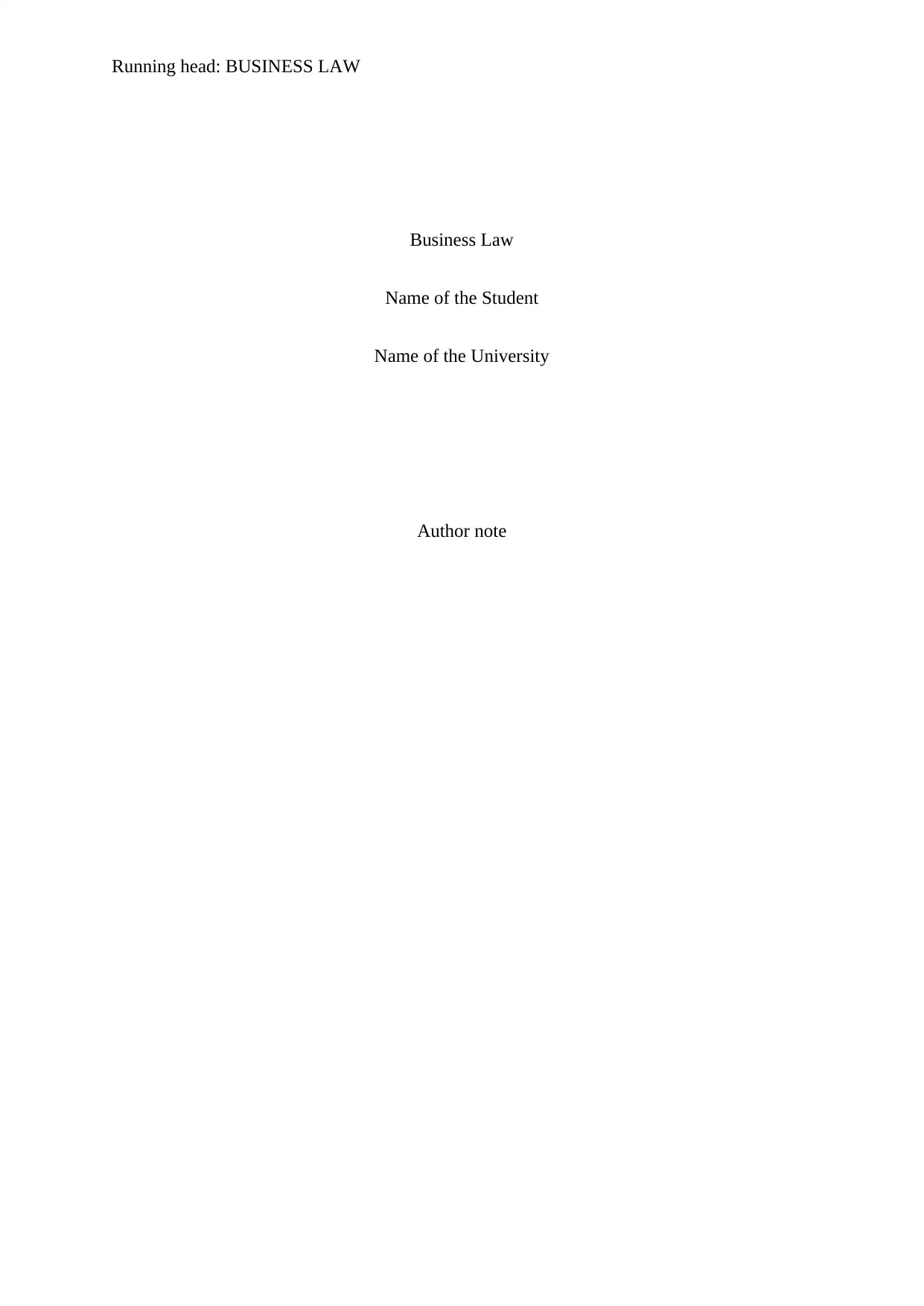
Running head: BUSINESS LAW
Business Law
Name of the Student
Name of the University
Author note
Business Law
Name of the Student
Name of the University
Author note
Paraphrase This Document
Need a fresh take? Get an instant paraphrase of this document with our AI Paraphraser
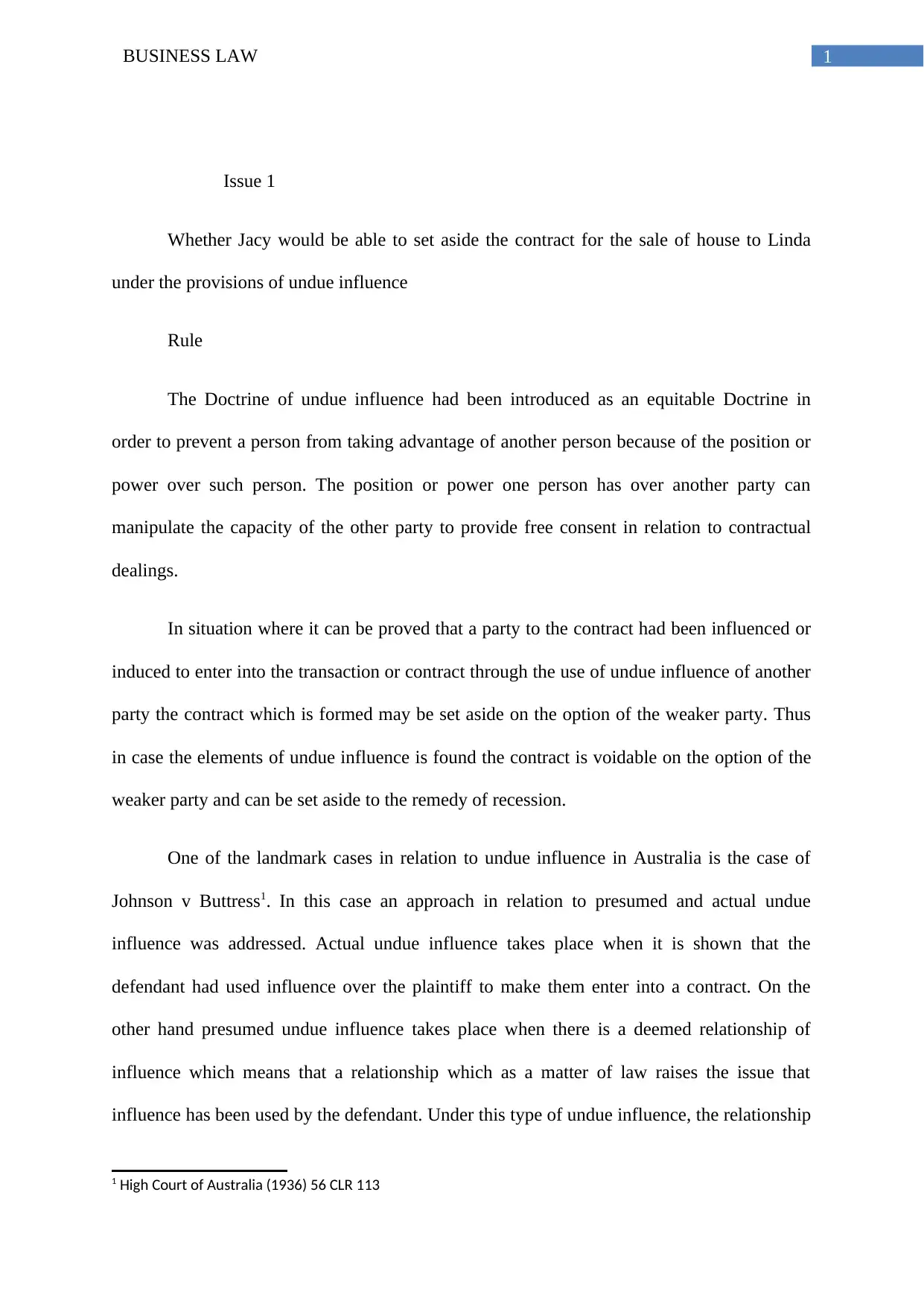
1BUSINESS LAW
Issue 1
Whether Jacy would be able to set aside the contract for the sale of house to Linda
under the provisions of undue influence
Rule
The Doctrine of undue influence had been introduced as an equitable Doctrine in
order to prevent a person from taking advantage of another person because of the position or
power over such person. The position or power one person has over another party can
manipulate the capacity of the other party to provide free consent in relation to contractual
dealings.
In situation where it can be proved that a party to the contract had been influenced or
induced to enter into the transaction or contract through the use of undue influence of another
party the contract which is formed may be set aside on the option of the weaker party. Thus
in case the elements of undue influence is found the contract is voidable on the option of the
weaker party and can be set aside to the remedy of recession.
One of the landmark cases in relation to undue influence in Australia is the case of
Johnson v Buttress1. In this case an approach in relation to presumed and actual undue
influence was addressed. Actual undue influence takes place when it is shown that the
defendant had used influence over the plaintiff to make them enter into a contract. On the
other hand presumed undue influence takes place when there is a deemed relationship of
influence which means that a relationship which as a matter of law raises the issue that
influence has been used by the defendant. Under this type of undue influence, the relationship
1 High Court of Australia (1936) 56 CLR 113
Issue 1
Whether Jacy would be able to set aside the contract for the sale of house to Linda
under the provisions of undue influence
Rule
The Doctrine of undue influence had been introduced as an equitable Doctrine in
order to prevent a person from taking advantage of another person because of the position or
power over such person. The position or power one person has over another party can
manipulate the capacity of the other party to provide free consent in relation to contractual
dealings.
In situation where it can be proved that a party to the contract had been influenced or
induced to enter into the transaction or contract through the use of undue influence of another
party the contract which is formed may be set aside on the option of the weaker party. Thus
in case the elements of undue influence is found the contract is voidable on the option of the
weaker party and can be set aside to the remedy of recession.
One of the landmark cases in relation to undue influence in Australia is the case of
Johnson v Buttress1. In this case an approach in relation to presumed and actual undue
influence was addressed. Actual undue influence takes place when it is shown that the
defendant had used influence over the plaintiff to make them enter into a contract. On the
other hand presumed undue influence takes place when there is a deemed relationship of
influence which means that a relationship which as a matter of law raises the issue that
influence has been used by the defendant. Under this type of undue influence, the relationship
1 High Court of Australia (1936) 56 CLR 113
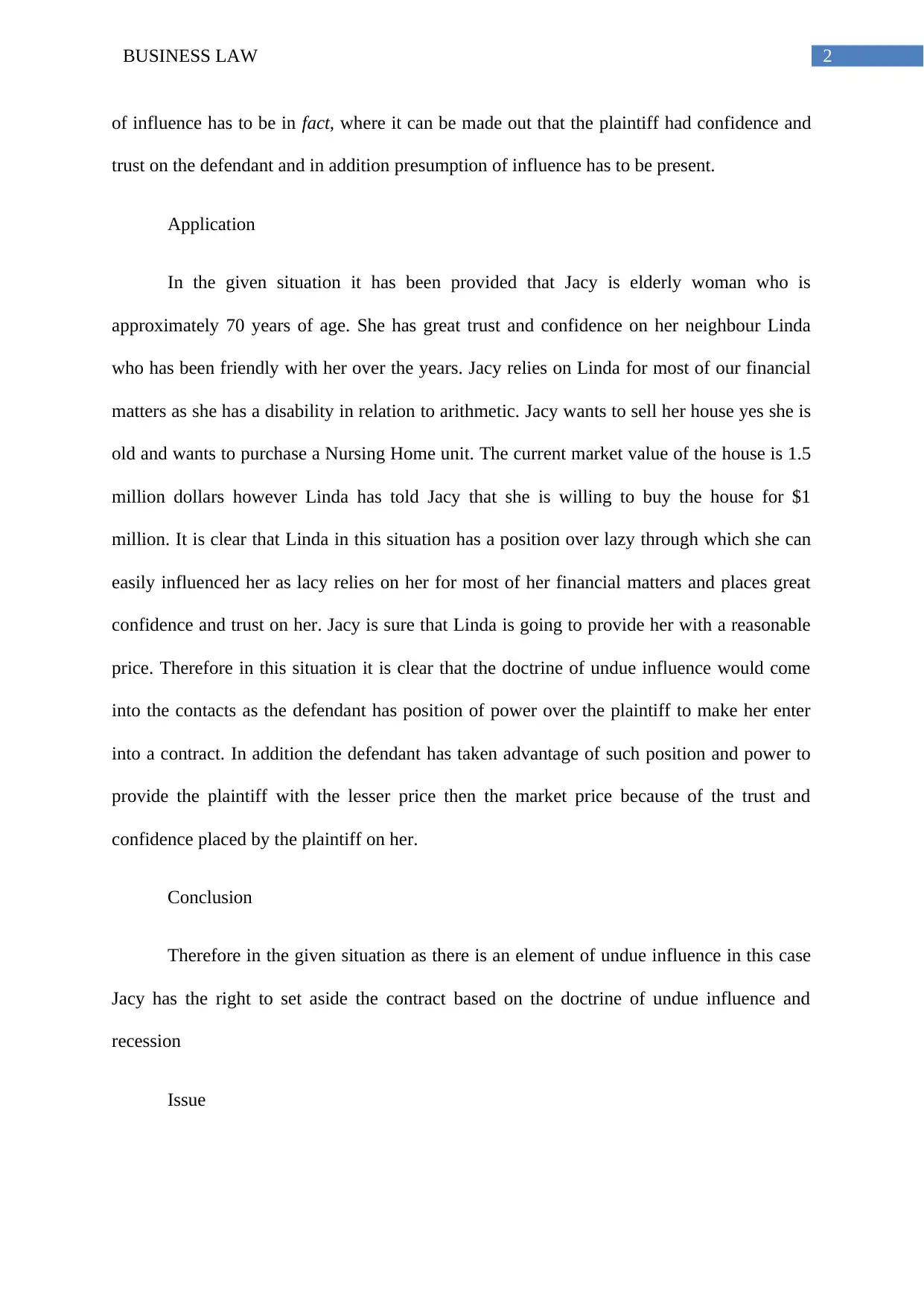
2BUSINESS LAW
of influence has to be in fact, where it can be made out that the plaintiff had confidence and
trust on the defendant and in addition presumption of influence has to be present.
Application
In the given situation it has been provided that Jacy is elderly woman who is
approximately 70 years of age. She has great trust and confidence on her neighbour Linda
who has been friendly with her over the years. Jacy relies on Linda for most of our financial
matters as she has a disability in relation to arithmetic. Jacy wants to sell her house yes she is
old and wants to purchase a Nursing Home unit. The current market value of the house is 1.5
million dollars however Linda has told Jacy that she is willing to buy the house for $1
million. It is clear that Linda in this situation has a position over lazy through which she can
easily influenced her as lacy relies on her for most of her financial matters and places great
confidence and trust on her. Jacy is sure that Linda is going to provide her with a reasonable
price. Therefore in this situation it is clear that the doctrine of undue influence would come
into the contacts as the defendant has position of power over the plaintiff to make her enter
into a contract. In addition the defendant has taken advantage of such position and power to
provide the plaintiff with the lesser price then the market price because of the trust and
confidence placed by the plaintiff on her.
Conclusion
Therefore in the given situation as there is an element of undue influence in this case
Jacy has the right to set aside the contract based on the doctrine of undue influence and
recession
Issue
of influence has to be in fact, where it can be made out that the plaintiff had confidence and
trust on the defendant and in addition presumption of influence has to be present.
Application
In the given situation it has been provided that Jacy is elderly woman who is
approximately 70 years of age. She has great trust and confidence on her neighbour Linda
who has been friendly with her over the years. Jacy relies on Linda for most of our financial
matters as she has a disability in relation to arithmetic. Jacy wants to sell her house yes she is
old and wants to purchase a Nursing Home unit. The current market value of the house is 1.5
million dollars however Linda has told Jacy that she is willing to buy the house for $1
million. It is clear that Linda in this situation has a position over lazy through which she can
easily influenced her as lacy relies on her for most of her financial matters and places great
confidence and trust on her. Jacy is sure that Linda is going to provide her with a reasonable
price. Therefore in this situation it is clear that the doctrine of undue influence would come
into the contacts as the defendant has position of power over the plaintiff to make her enter
into a contract. In addition the defendant has taken advantage of such position and power to
provide the plaintiff with the lesser price then the market price because of the trust and
confidence placed by the plaintiff on her.
Conclusion
Therefore in the given situation as there is an element of undue influence in this case
Jacy has the right to set aside the contract based on the doctrine of undue influence and
recession
Issue
⊘ This is a preview!⊘
Do you want full access?
Subscribe today to unlock all pages.

Trusted by 1+ million students worldwide
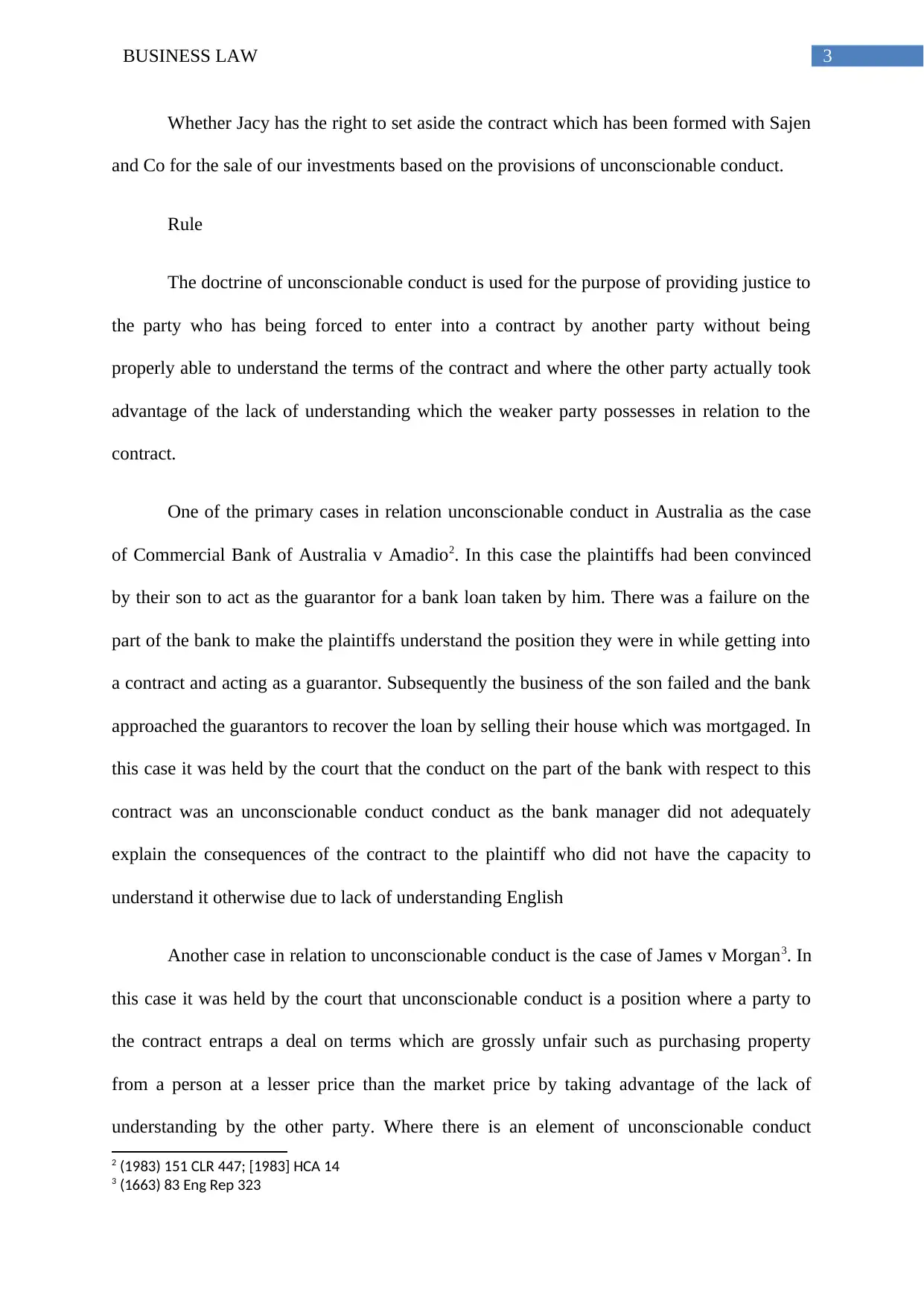
3BUSINESS LAW
Whether Jacy has the right to set aside the contract which has been formed with Sajen
and Co for the sale of our investments based on the provisions of unconscionable conduct.
Rule
The doctrine of unconscionable conduct is used for the purpose of providing justice to
the party who has being forced to enter into a contract by another party without being
properly able to understand the terms of the contract and where the other party actually took
advantage of the lack of understanding which the weaker party possesses in relation to the
contract.
One of the primary cases in relation unconscionable conduct in Australia as the case
of Commercial Bank of Australia v Amadio2. In this case the plaintiffs had been convinced
by their son to act as the guarantor for a bank loan taken by him. There was a failure on the
part of the bank to make the plaintiffs understand the position they were in while getting into
a contract and acting as a guarantor. Subsequently the business of the son failed and the bank
approached the guarantors to recover the loan by selling their house which was mortgaged. In
this case it was held by the court that the conduct on the part of the bank with respect to this
contract was an unconscionable conduct conduct as the bank manager did not adequately
explain the consequences of the contract to the plaintiff who did not have the capacity to
understand it otherwise due to lack of understanding English
Another case in relation to unconscionable conduct is the case of James v Morgan3. In
this case it was held by the court that unconscionable conduct is a position where a party to
the contract entraps a deal on terms which are grossly unfair such as purchasing property
from a person at a lesser price than the market price by taking advantage of the lack of
understanding by the other party. Where there is an element of unconscionable conduct
2 (1983) 151 CLR 447; [1983] HCA 14
3 (1663) 83 Eng Rep 323
Whether Jacy has the right to set aside the contract which has been formed with Sajen
and Co for the sale of our investments based on the provisions of unconscionable conduct.
Rule
The doctrine of unconscionable conduct is used for the purpose of providing justice to
the party who has being forced to enter into a contract by another party without being
properly able to understand the terms of the contract and where the other party actually took
advantage of the lack of understanding which the weaker party possesses in relation to the
contract.
One of the primary cases in relation unconscionable conduct in Australia as the case
of Commercial Bank of Australia v Amadio2. In this case the plaintiffs had been convinced
by their son to act as the guarantor for a bank loan taken by him. There was a failure on the
part of the bank to make the plaintiffs understand the position they were in while getting into
a contract and acting as a guarantor. Subsequently the business of the son failed and the bank
approached the guarantors to recover the loan by selling their house which was mortgaged. In
this case it was held by the court that the conduct on the part of the bank with respect to this
contract was an unconscionable conduct conduct as the bank manager did not adequately
explain the consequences of the contract to the plaintiff who did not have the capacity to
understand it otherwise due to lack of understanding English
Another case in relation to unconscionable conduct is the case of James v Morgan3. In
this case it was held by the court that unconscionable conduct is a position where a party to
the contract entraps a deal on terms which are grossly unfair such as purchasing property
from a person at a lesser price than the market price by taking advantage of the lack of
understanding by the other party. Where there is an element of unconscionable conduct
2 (1983) 151 CLR 447; [1983] HCA 14
3 (1663) 83 Eng Rep 323
Paraphrase This Document
Need a fresh take? Get an instant paraphrase of this document with our AI Paraphraser
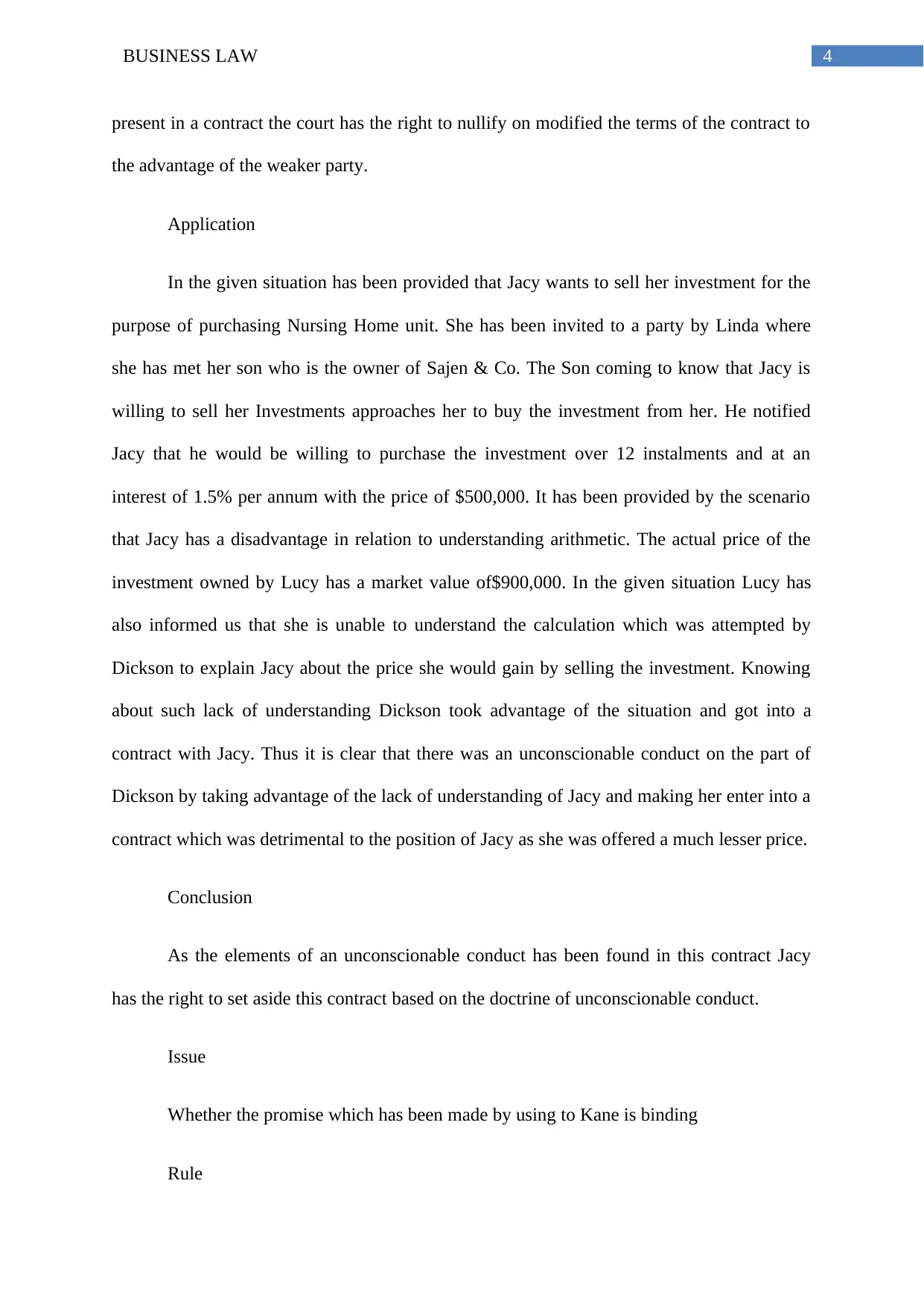
4BUSINESS LAW
present in a contract the court has the right to nullify on modified the terms of the contract to
the advantage of the weaker party.
Application
In the given situation has been provided that Jacy wants to sell her investment for the
purpose of purchasing Nursing Home unit. She has been invited to a party by Linda where
she has met her son who is the owner of Sajen & Co. The Son coming to know that Jacy is
willing to sell her Investments approaches her to buy the investment from her. He notified
Jacy that he would be willing to purchase the investment over 12 instalments and at an
interest of 1.5% per annum with the price of $500,000. It has been provided by the scenario
that Jacy has a disadvantage in relation to understanding arithmetic. The actual price of the
investment owned by Lucy has a market value of$900,000. In the given situation Lucy has
also informed us that she is unable to understand the calculation which was attempted by
Dickson to explain Jacy about the price she would gain by selling the investment. Knowing
about such lack of understanding Dickson took advantage of the situation and got into a
contract with Jacy. Thus it is clear that there was an unconscionable conduct on the part of
Dickson by taking advantage of the lack of understanding of Jacy and making her enter into a
contract which was detrimental to the position of Jacy as she was offered a much lesser price.
Conclusion
As the elements of an unconscionable conduct has been found in this contract Jacy
has the right to set aside this contract based on the doctrine of unconscionable conduct.
Issue
Whether the promise which has been made by using to Kane is binding
Rule
present in a contract the court has the right to nullify on modified the terms of the contract to
the advantage of the weaker party.
Application
In the given situation has been provided that Jacy wants to sell her investment for the
purpose of purchasing Nursing Home unit. She has been invited to a party by Linda where
she has met her son who is the owner of Sajen & Co. The Son coming to know that Jacy is
willing to sell her Investments approaches her to buy the investment from her. He notified
Jacy that he would be willing to purchase the investment over 12 instalments and at an
interest of 1.5% per annum with the price of $500,000. It has been provided by the scenario
that Jacy has a disadvantage in relation to understanding arithmetic. The actual price of the
investment owned by Lucy has a market value of$900,000. In the given situation Lucy has
also informed us that she is unable to understand the calculation which was attempted by
Dickson to explain Jacy about the price she would gain by selling the investment. Knowing
about such lack of understanding Dickson took advantage of the situation and got into a
contract with Jacy. Thus it is clear that there was an unconscionable conduct on the part of
Dickson by taking advantage of the lack of understanding of Jacy and making her enter into a
contract which was detrimental to the position of Jacy as she was offered a much lesser price.
Conclusion
As the elements of an unconscionable conduct has been found in this contract Jacy
has the right to set aside this contract based on the doctrine of unconscionable conduct.
Issue
Whether the promise which has been made by using to Kane is binding
Rule
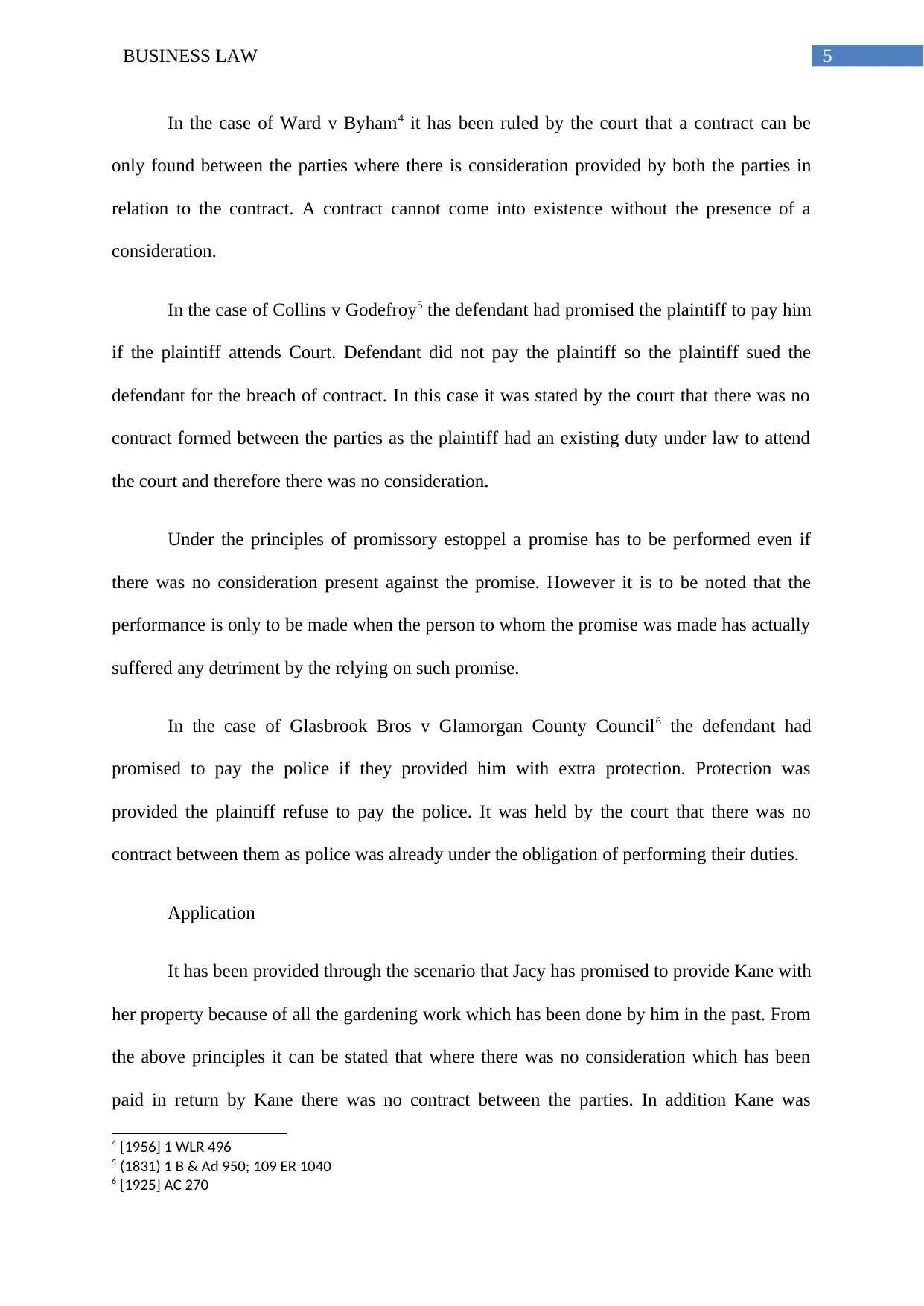
5BUSINESS LAW
In the case of Ward v Byham4 it has been ruled by the court that a contract can be
only found between the parties where there is consideration provided by both the parties in
relation to the contract. A contract cannot come into existence without the presence of a
consideration.
In the case of Collins v Godefroy5 the defendant had promised the plaintiff to pay him
if the plaintiff attends Court. Defendant did not pay the plaintiff so the plaintiff sued the
defendant for the breach of contract. In this case it was stated by the court that there was no
contract formed between the parties as the plaintiff had an existing duty under law to attend
the court and therefore there was no consideration.
Under the principles of promissory estoppel a promise has to be performed even if
there was no consideration present against the promise. However it is to be noted that the
performance is only to be made when the person to whom the promise was made has actually
suffered any detriment by the relying on such promise.
In the case of Glasbrook Bros v Glamorgan County Council6 the defendant had
promised to pay the police if they provided him with extra protection. Protection was
provided the plaintiff refuse to pay the police. It was held by the court that there was no
contract between them as police was already under the obligation of performing their duties.
Application
It has been provided through the scenario that Jacy has promised to provide Kane with
her property because of all the gardening work which has been done by him in the past. From
the above principles it can be stated that where there was no consideration which has been
paid in return by Kane there was no contract between the parties. In addition Kane was
4 [1956] 1 WLR 496
5 (1831) 1 B & Ad 950; 109 ER 1040
6 [1925] AC 270
In the case of Ward v Byham4 it has been ruled by the court that a contract can be
only found between the parties where there is consideration provided by both the parties in
relation to the contract. A contract cannot come into existence without the presence of a
consideration.
In the case of Collins v Godefroy5 the defendant had promised the plaintiff to pay him
if the plaintiff attends Court. Defendant did not pay the plaintiff so the plaintiff sued the
defendant for the breach of contract. In this case it was stated by the court that there was no
contract formed between the parties as the plaintiff had an existing duty under law to attend
the court and therefore there was no consideration.
Under the principles of promissory estoppel a promise has to be performed even if
there was no consideration present against the promise. However it is to be noted that the
performance is only to be made when the person to whom the promise was made has actually
suffered any detriment by the relying on such promise.
In the case of Glasbrook Bros v Glamorgan County Council6 the defendant had
promised to pay the police if they provided him with extra protection. Protection was
provided the plaintiff refuse to pay the police. It was held by the court that there was no
contract between them as police was already under the obligation of performing their duties.
Application
It has been provided through the scenario that Jacy has promised to provide Kane with
her property because of all the gardening work which has been done by him in the past. From
the above principles it can be stated that where there was no consideration which has been
paid in return by Kane there was no contract between the parties. In addition Kane was
4 [1956] 1 WLR 496
5 (1831) 1 B & Ad 950; 109 ER 1040
6 [1925] AC 270
⊘ This is a preview!⊘
Do you want full access?
Subscribe today to unlock all pages.

Trusted by 1+ million students worldwide
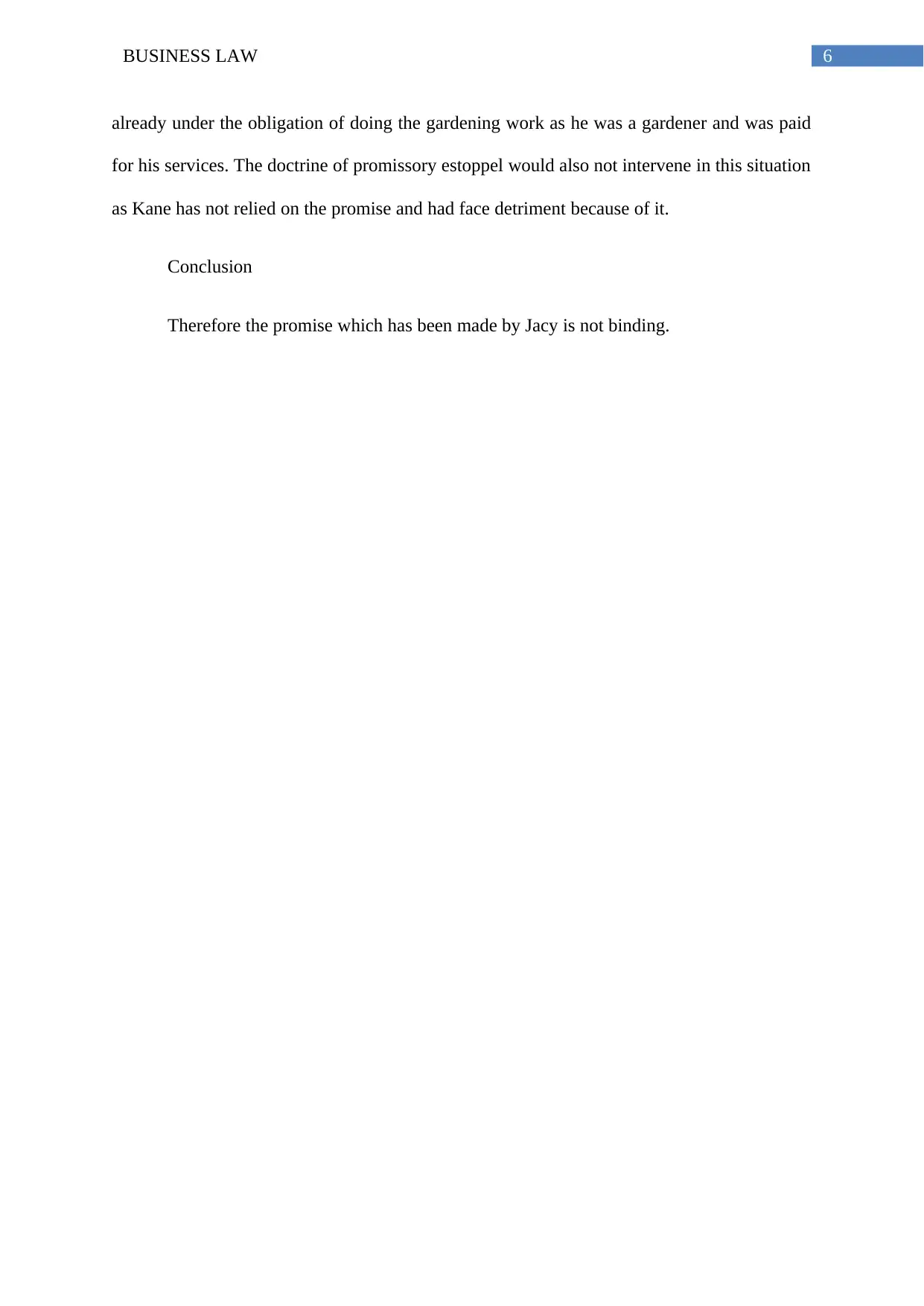
6BUSINESS LAW
already under the obligation of doing the gardening work as he was a gardener and was paid
for his services. The doctrine of promissory estoppel would also not intervene in this situation
as Kane has not relied on the promise and had face detriment because of it.
Conclusion
Therefore the promise which has been made by Jacy is not binding.
already under the obligation of doing the gardening work as he was a gardener and was paid
for his services. The doctrine of promissory estoppel would also not intervene in this situation
as Kane has not relied on the promise and had face detriment because of it.
Conclusion
Therefore the promise which has been made by Jacy is not binding.
Paraphrase This Document
Need a fresh take? Get an instant paraphrase of this document with our AI Paraphraser
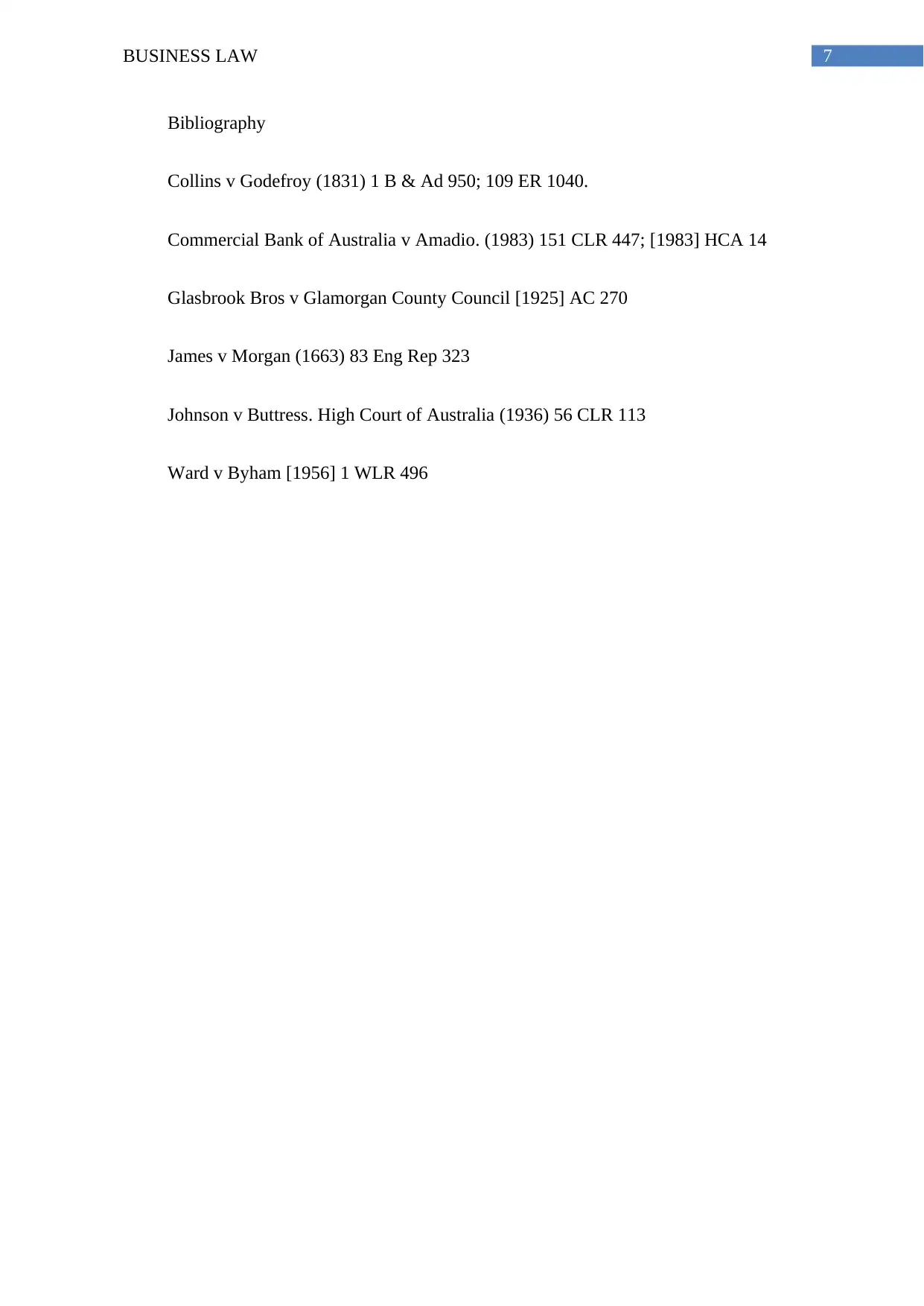
7BUSINESS LAW
Bibliography
Collins v Godefroy (1831) 1 B & Ad 950; 109 ER 1040.
Commercial Bank of Australia v Amadio. (1983) 151 CLR 447; [1983] HCA 14
Glasbrook Bros v Glamorgan County Council [1925] AC 270
James v Morgan (1663) 83 Eng Rep 323
Johnson v Buttress. High Court of Australia (1936) 56 CLR 113
Ward v Byham [1956] 1 WLR 496
Bibliography
Collins v Godefroy (1831) 1 B & Ad 950; 109 ER 1040.
Commercial Bank of Australia v Amadio. (1983) 151 CLR 447; [1983] HCA 14
Glasbrook Bros v Glamorgan County Council [1925] AC 270
James v Morgan (1663) 83 Eng Rep 323
Johnson v Buttress. High Court of Australia (1936) 56 CLR 113
Ward v Byham [1956] 1 WLR 496
1 out of 8
Related Documents
Your All-in-One AI-Powered Toolkit for Academic Success.
+13062052269
info@desklib.com
Available 24*7 on WhatsApp / Email
![[object Object]](/_next/static/media/star-bottom.7253800d.svg)
Unlock your academic potential
Copyright © 2020–2025 A2Z Services. All Rights Reserved. Developed and managed by ZUCOL.




